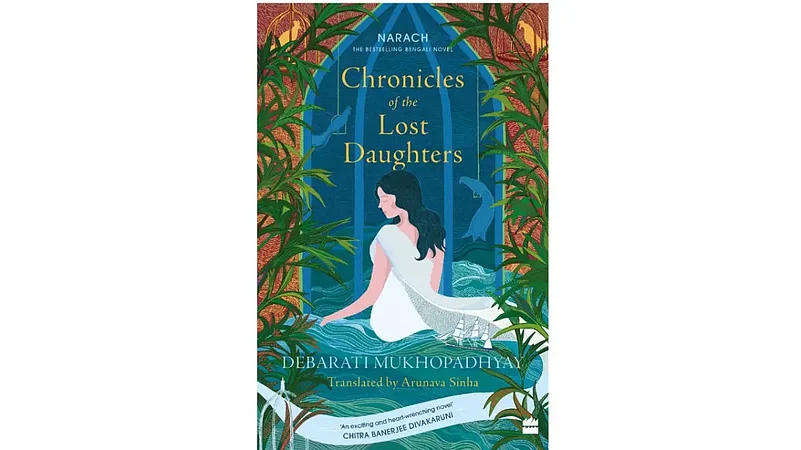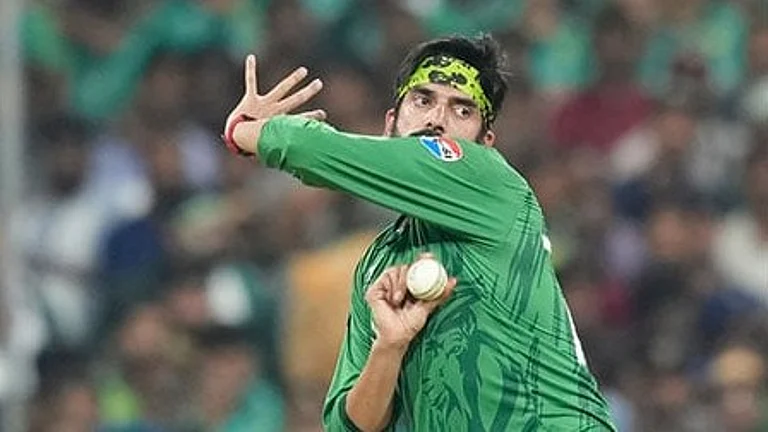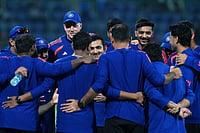After a pause Paanchkori Mukhopadhyay said, ‘A raped woman must of course perform strict penance. In this case the rapists are from another religion, which means that even if she herself is a brahmoni, the act has made a mleccha out of her. She will be restored to her own people if a high-born brahmon is willing to accept her services for two fortnights.’
Unable to decipher this ruling, Krishnoshundor gaped at Paanchkori Mukhopadhyay, who decided to explain. ‘You don’t understand? A suitable brahmon must agree to let your sister offer her services to him for two fortnights. The inherent holiness of the twice-born will eliminate your sister’s impurity. You must have read in the Atrisamhita that a raped woman can be considered pure again after one month. Bhubonmoni can return to normal life. Do you understand now?’
‘Agge,’ said an overwhelmed Krishnoshundor, ‘That should not be difficult. We have Lahiri-moshai here, Bhubonmoni can go to his house and look after him for a month like his daughter. That will do, will it not?’
Panchkori Mukhopadhyay’s expression changed at once. He concentrated on his hookah in irritation. His attendant Lalu glared in fury at Krishnoshundor.
Gopi Lahiri stepped into the arena at once for damage control. ‘Don’t talk like a fool, Keshto. That’s not the service he’s talking about. Try to understand what Mukhujjemoshai is saying. A body made impure by the seed of the mlechha must be purified by the seed of the brahmon. This is the kind of service that Radha offered Krishna, with mind and body.’
Suddenly Paanchkori Mukhopadhyay’s real intent became clear to Krishnoshundor. Thunderstruck, he looked at the door leading to the inner chambers. Although she was invisible, he could sense Brahmomoyee’s silent presence behind the door.

How very unfair! So Bhubonmoni would have to be raped for a month because some criminals had raped her once? This was utterly unjust, which shastras asked for this? Krishnoshundor could sign an oath it was impossible for such a thing to be written in any of the shastras. It was impossible.
Shaking his head, Paanchkori Mukhopadhyay said, ‘But I doubt whether any suitable brahmon will agree. For Bhubonmoni is a heathen herself now after being raped by heathens. And Manu’s verdict is clear here: Shudrang shoyonmaropyo brahmano… A brahmon is debased when he cohabits with a shudra or a heathen. Engendering a child also dismantles his caste status. Then who will voluntarily accept Bhubonmoni’s service?
Unless, however, it is a particularly noble brahmon, in which case there is no debasement. You have to consider it a matter of great fortune if you find such a person.’ ‘Is there a suitable person in our village?’ Gopi Lahiri made a strange gesture with his hands and launched the question on the wind.
‘That’s for you to find out. You can look in the neighbouring villages too if there’s no one here. But do not delay. Three days have passed already, unless the expiation can begin within five nights of rape all efforts will be in vain. In that case Krishnoshundor will have no choice but to drive his sister out of his house, he will also be ostracized.’ Paanchkori Mukhopadhyay rose to his feet without expending any more words.
‘Long live Mukhujjemoshai! We can only admire the felicitous manner of atonement he has advised.’ Ramchondro Nyaytirtho raised his joined palms to his forehead deferentially. ‘Bow to Mukhujjemoshai, Keshto, he has saved you from ostracization. Now you can safely go to your afterlife.’
Krishnoshundor remained rooted to the spot.
Lalu took Paanchkori Mukhopadhyay’s hookah and led him away homeward.
Bromhomoyee emerged once the pillars of society had left with their entourage. She was livid with rage.
Her sister-in-law Bhubonmoni was like her daughter. Bhubonmoni was a girl of five when Bromhomoyee became part of this household. She was married at eight, and was dressed in a widow’s garb before the year was out. Since then Bromhomoyee had taken care of her sister-in-law with the love of a mother, even joining the little girl in fasting when rituals demanded.
Her heart was already broken at the injustice meted out to Bhubonmoni, now she could no longer contain herself after this discussion.
Bromhomoyee was a spirited woman, not passive like her husband. She belonged to an affluent family, her father was a brahmin priest in the good books of Krishnachandra Roy, the king of Nadia.
Krishnoshundor’s father Ramendrashundor belonged to a family suitable for a matrimonial connection with hers. Attracted by the lineage and, above all, by the boy’s depth of knowledge, Bromhomoyee’s father had picked the family for his daughter.
Although Krishnoshundor’s standing in the world had been weakened by the ravages of time, Bromhomoyee’s personality had remained unshakeable. She might have been illiterate, but her acumen and wisdom when it came to managing the home would put many an educated man to shame. Her heart was as generous as the family she came from.
‘What’s all this?’ Bromhomoyee asked. ‘Why didn’t you protest?’
‘What use would it be?’ Krishnoshundor sounded broken. ‘Living in the jungle and striking up enmity with the lion is insanity. What do I have to fight with? I’m a tin soldier with no armour and no weapons.’
‘You have your honour, if not anything else,’ Bromhomoyee told him firmly. ‘Considering what thakurji is going through, you should be bringing a good doctor home to see her. But no, instead we had these people reciting the shastras at us.’
‘How can we disobey the shastras,’ Krishnoshundor said. ‘I don’t fear ostracization. I can cultivate whatever little land I have, I will make do with this, and I have enough faith to know you will too. We can even make do without the washerman or the barber. But how will I afford to get the two girls married. Thanks to dada we won’t get a good family anyway, and then if this whole thing isn’t suppressed right now we won’t even get good boys for them.’
‘So be it. But I will not knowingly push thakurji towards ruination. Don’t you see that dirty old man from Jonai has got his eyes on her? He’s on the doorstep of death but he’s still got his tongue hanging out. He’s planning to use this opportunity to have Bhubon in his bed for a month.’ Bromhomoyee’s voice was blazing now. ‘I spit on the face of a learned man like him.’
‘Not so loud, even walls have ears,’ said a terrified Krishnoshundor. ‘Mukhujjemoshai’s reach is everywhere. Someone will hear and we’ll be evicted overnight from our own home. Not even jomidarmoshai will be able to do anything. And do you know what it will mean if we don’t get boys for our daughters? Do you realize the kind of trouble there will be if Awpala isn’t married before she’s twelve?’
‘Why don’t you accept the women you’ve named them after as your ideals?’ Bromhomoyee’s question was unambiguous.
Krishnoshundor said, ‘I do. That’s why I’m getting Awpala educated, Bromhomoyee. My dream is that she will grow up an accomplished woman, that she will teach young children. That is why I seek a liberal minded family for her.’
‘Then why do you worry about their marriage? You’ve told me yourself many sages and women in the boidik age remained unmarried. Did that lead to trouble?’
‘That age is gone, Bromhomoyee.’ Krishnoshundor smiled wanly with sadness in his eyes. ‘That was the age of shruti. Women enjoyed high social standing, they used to study the Vedas, they used to teach. They were not yet considered anyone’s property. A wife was her husband’s partner in every sense, not just his companion in bed as she is now. But those days are gone. The diagnoses of the learned men, Muslim rule and patriarchy in society have gradually pushed women back into their homes and turned them into puppets. It is the age of the Manusamhita. The woman will be subservient to her father in childhood, to her husband after marriage, and to her son when she is a widow. She will never have an independent life. How can you speak of your own daughters remaining unmarried in such circumstances?’
Gopi Lahiri returned during the conversation between husband and wife.
Brahmomoyee’s inference was correct. Gopi Lahiri said, ‘Only the fortunate get an opportunity like this, Keshto. After many entreaties Mukhujjemoshai himself has agreed to lift Bhubonmoni out of the mire. There’s no need to think twice, even if you comb all the villages nearby you won’t find another brahmon as worthy. Let the day pass, no need to tell anyone, from tomorrow Mukhujjemoshai’s palanquin will come to your yard every evening, send your sister. It’s only because I’m a well-wisher that I walked all this way despite my gout to tell you.’
Krishnoshundor did not answer.
Gopi Lahiri continued in a low voice, ‘You can imagine what will happen if you do not send her. Don’t forget you have two daughters. Look after your own interests before your sister’s.’
Excerpted from Chronicles of the Lost Daughters by Debarati Mukhopadhyay, translated by Arunava Sinha (pp. 336, Rs 499), with permission from HarperCollins India
(Debarati Mukhopadhyay is one of the most popular authors from Bengal. Arunava Sinha translates classic, modern and contemporary Bengali fiction and non-fiction into English.)





















